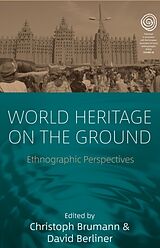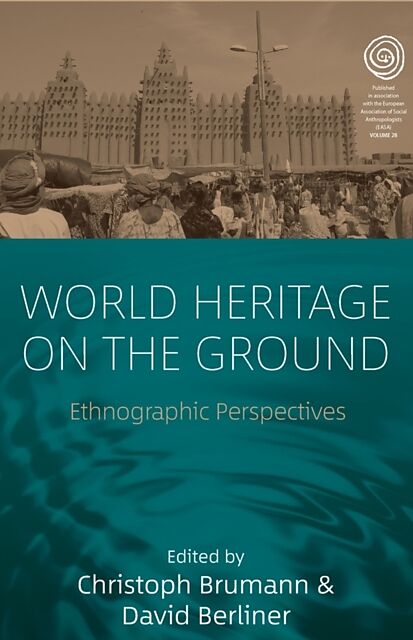World Heritage on the Ground
Einband:
Kartonierter Einband
EAN:
9781789200614
Untertitel:
Ethnographic Perspectives
Genre:
Sozialwissenschaften allgemein
Autor:
Christoph Berliner, David Brumann
Herausgeber:
Ingram Publishers Services
Anzahl Seiten:
336
Erscheinungsdatum:
13.07.2018
ISBN:
978-1-78920-061-4
this excellent book provides thoughtful critiques of UNESCO, state organizations, developers, and the tourist bureaus that translate and reconfigure UNESCO policies in glocalizing ways. Several chapters interrogate the category of 'World Heritage' and at times seek to unsettle some of the taken-for-granted Euro-North American 'humanist' and 'enlightenment' ideologies that arguably underpin the UNESCO project. Whilst research into the distances between the discourses of World Heritage, the experiences of local stakeholders, and 'local' subjects is not new, this volume offers an original take on the extant literature through its very intimate portrayals of local subjects. • Journal of the Royal Anthropological Institute (JRAI) This volume makes a significant contribution to what the editors call 'a comprehensive understanding of the social environment of World Heritage properties' (p. 28) or what more simply might be called 'World Heritage anthropology'. This book will be an essential reference for anyone interested in World Heritage issues. • Anthropological Notebooks What strikes the reader in all chapters is the richness of detail, the diversity of issues and contested perspectives revealed by ethnographic detail. Particularly valuable are studies that allow for exploring changing dynamics over time. The book demonstrates the diversity of actors and issues involved in some respects offering a reality check, which is direly needed also in heritage policy deliberations. World heritage, the chapters teach us, is much more than a universal endeavour, and we need to take this diversity of issues and heritage processes seriously. Not all is harmonious in the realm of world heritage, and the volume offers important ethnographic insights as well as new theoretical avenues for heritage studies and policy makers at large. • International Journal of Heritage Studies This work edited by Christoph Brumann and David Berliner delivers what it promises, that is, a skilfull bringing-together of two equally legitimate approaches: a top-down one, which investigates UNESCO's World Heritage Program as a global institution, and a grassroots one, which seeks for local applications and implications of patrimonial decisions taken 'up there'. • Martor. The Museum of the Romanian Peasant Anthropology Review [This volume] is offering what it promises, meaning a perfect articulation of two equally legitimate approaches: a top-down one, investigating UNESCO's World Heritage as a global institution, and a grass-roots one, searching for local applications and implications of patrimonial decisions taken up-there. • Anuac Journal This is a fascinating volume whose contributions analyze, highly critically for the most part, various aspects of the effects of World Heritage nominations. It enables new insights into the problematic nature of World Heritage and shows in what way different interest groups for different reasons get involved in World Heritage locations, be it out of nostalgia, financial interests, political opportunism or as location for religious activities. • Sociologus The anthology presents case studies not only useful for furthering the field of heritage studies, but also for opening up the field of heritage to the anthropology of international institutions. • Heritage & Society This strong new collection of essays on World Heritage sites illustrates the point well, that what institutions intend or believe, and what governments claim, are often not what we observe in practice. • Anthropology Review Database This is one of the most important current books in cultural heritage studies to date, a must-read so engrossing and compelling that it is truly a page-turner. Its greatest strength is the evidence each author provides of the value of ethnography in this field. If only UNESCO's World Heritage bureaucracy, the affiliated States Parties representatives, and national heritage authorities would read it and be moved to pursue greater equity for the local stakeholders whose needs are clearly legitimate yet rarely accommodated. • American Ethnologist This is a useful volume, providing much needed case studies while remaining clearly focused and thought provoking. • Marie Louise Stig Sorensen, Division of Archaeology, University of Cambridge This volume will be appreciated for its rich case studies, which develop a comparative understanding of heritage impactsa crucial task for the interdisciplinary field of heritage studies. • Regina F. Bendix, European Ethnology, University of Göttingen International experts and national representatives hold the most sway in defining World Heritage sites and their likely social impact. This book focuses precisely on how such definitions of heritage are objectified and circulate in public usage. • Michael Rowlands, Department of Anthropology, University College London
Autorentext
David Berliner is Professor of Anthropology at the Université libre de Bruxelles, Belgium.
Klappentext
The UNESCO World Heritage Convention of 1972 set the contemporary standard for cultural and natural conservation. Today, a place on the World Heritage List is much sought after for tourism promotion, development funding, and national prestige. Presenting case studies from across the globe, particularly from Africa and Asia, anthropologists with situated expertise in specific World Heritage sites explore the consequences of the World Heritage framework and the global spread of the UNESCO heritage regime. This book shows how local and national circumstances interact with the global institutional framework in complex and unexpected ways. Often, the communities around World Heritage sites are constrained by these heritage regimes rather than empowered by them.
Inhalt
List of Illustrations Introduction: UNESCO World Heritage Grounded?
Christoph Brumann and David Berliner PART I: CITIES Chapter 1. Affects and Senses in a World Heritage Site: PeopleHouse Relations in the Medina of Fez
Manon Istasse Chapter 2. 'UNESCO is What?' World Heritage, Militant Islam and the Search for a Common Humanity in Mali
Charlotte Joy Chapter 3. Heritage-making in Lijiang: Governance, Reconstruction and Local Naxi Life
Yujie Zhu Chapter 4. Multiple Nostalgias: The Fabric of Heritage in Luang Prabang (Lao PDR)
David Berliner PART II: ARCHAEOLOGICAL SITES Chapter 5. Thinking Globally and Acting Locally in the Angkor World Heritage Site
Keiko Miura Chapter 6. One List, a World of Difference? The Dynamics of Global Heritage at Two Neighbouring Properties
Noel B. Salazar Chapter 7. Civilization and the Transformation of Xiaotun Village at Yin Xu Archaeological Site, China
Shu-Li Wang Chapter 8. The Business of Wonder: Public Meets Private at the World Heritage Site of Chichén Itzá
Lisa Breglia PART III: CULTURAL LANDSCAPES Chapter 9. Decolo…

Leider konnten wir für diesen Artikel keine Preise ermitteln ...
billigbuch.ch sucht jetzt für Sie die besten Angebote ...
Die aktuellen Verkaufspreise von 6 Onlineshops werden in Realtime abgefragt.
Sie können das gewünschte Produkt anschliessend direkt beim Anbieter Ihrer Wahl bestellen.
Loading...
Die aktuellen Verkaufspreise von 6 Onlineshops werden in Realtime abgefragt.
Sie können das gewünschte Produkt anschliessend direkt beim Anbieter Ihrer Wahl bestellen.
| # | Onlineshop | Preis CHF | Versand CHF | Total CHF | ||
|---|---|---|---|---|---|---|
| 1 | Seller | 0.00 | 0.00 | 0.00 |
